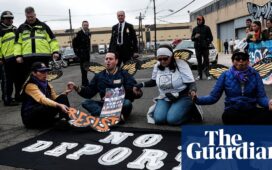Raids on migrants in cities including New York, Chicago and Miami could begin as early as Sunday, according to multiple reports.
The raids, which Donald Trump described in a tweet earlier this week, will target more than 2,000 migrants who have received letters ordering them to appear in immigration court, according to the Miami Herald.
The operation, which the Washington Post said the president has ordered, could target people in Miami, Atlanta, Chicago, Baltimore, Denver, Houston, Los Angeles, New Orleans, New York and San Francisco.
The Department of Homeland Security agency that oversees deportations, Immigration and Customs Enforcement (Ice), did not immediately respond to a request for comment.
Since Trump announced on Twitter that “millions” migrants would be deported next week, immigration advocacy groups across the US have said they are prepared for the raids, which could not reach a million people because of limited staffing at Ice.
“We have spent the last two and a half years learning how to respond to these situations, teaching our communities how to respond and creating materials with how to support them,” said Camille Mackler, director of immigration legal policy at the New York Immigration Council (NYIC).
NYIC represents more than 200 migrant and refugee communities in New York state, which has long been home to one of the biggest Central American populations in the US. Trump has for months complained about Central American families crossing the southern border.
This week, NYIC has ramped up education and awareness efforts, including encouraging people to use resources on its website, advising those who have received a deportation order to contact a lawyer and telling people to make a plan for their family in case they are arrested.
“We know how to respond to these raids,” Mackler said.
She and other immigration advocates condemned the raids as a political ploy timed to follow Trump’s formal announcement that he is running for re-election on Tuesday and to support an administration narrative that Central American families at the border are criminals, not people fleeing violence and poverty to pursue their right to seek asylum.
Sandra Cordero, director of Families Belong Together, a coalition fighting family separations, said in a statement the potential raids are “a disgusting political ploy to stoke fear and rile up Trump’s base for 2020”.
Cordero said: “This is yet another flagrant disregard for the welfare of children on behalf of a cruel administration bent on fomenting fear and creating chaos.”
The acting homeland security secretary, Kevin McAleenan, has been encouraging Ice to narrow the operation, according to the Washington Post. McAleenan reportedly raised concerns that the larger operation would lead to renewed family separation – because parents and guardians of US citizen children are expected to be affected – and undermine the agency’s argument that it needs emergency funding to address the record number of families approaching the border.
Though Trump has made aggressive immigration enforcement a cornerstone of his presidency, he has deported far fewer people than Barack Obama. In the last fiscal year, Ice removed 250,000 undocumented migrants compared to 410,000 removed in 2012.
Trump, however, has done away with deportation priorities Obama put in place in his second term, and used anti-migrant rhetoric that creates fear.
Kevin Lo, staff attorney for the Immigrant Rights Program at Asian Americans Advancing Justice’s Asian Law Caucus, said calls to the group’s multiple migration hotlines have increased since Trump’s tweet, with more people reporting activity that looks like it could be Ice.
Lo said the Cambodian community he works with has seen Ice raids every four months and that each time a raid occurs it has an immediate, devastating impact.
People who are able to fight their case in court still suffer devastating consequences, Lo said – after being arrested in a raid and detained, people lose work and fail to make payments on cars and homes, while trying to pay for calls to their family from detention and for family visits.
“Families definitely don’t recover from this,” Lo said, “even if their loved one gets to stay.”








